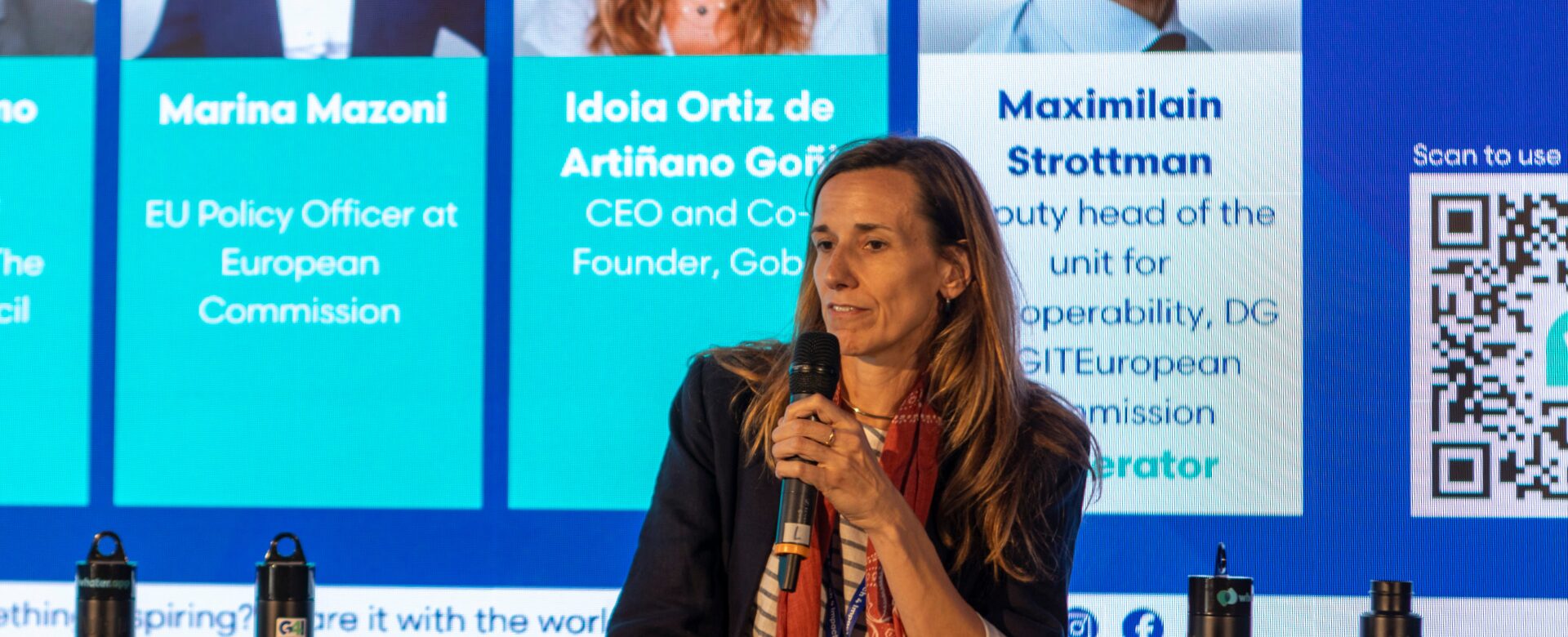EU GovTech Action
From Startup to Scaleup:
A Path to Innovation
with Maximilain Strottman,
David Osimo,
Marina Mazoni, and
Idoia Ortiz de Artiñano Goñi
EU GovTech Action - From Startup to Scaleup: A Path to Innovation
The journey from startup to scaleup is a familiar one for many in the GovTech space, but it presents unique challenges when applied to the public sector. During the GovTech 4 Impact World Congress (G4I) 2025, an insightful panel discussion titled “EU GovTech Action – From StartUp to Scaleup” explored these challenges, with experts shedding light on the obstacles and opportunities in scaling GovTech solutions across Europe.
The session, moderated by Maximilain Strottman, Deputy Head of the Unit for Interoperability at the European Commission’s DG DIGIT, brought together a diverse group of experts, including David Osimo, Director of Research at The Lisbon Council, Marina Mazoni, EU Policy Officer at the European Commission, and Idoia Ortiz de Artiñano Goñi, CEO and Co-Founder of Gobe.
The panel delved into how the European Union’s digital transformation efforts are helping GovTech startups scale and the role of policy and regulation in driving this growth. The discussion also highlighted the importance of collaboration between the public and private sectors and the integration of innovative solutions to improve government services across Europe.

Startups and Scaleups: The GovTech Journey
The discussion began with a focus on the current status of GovTech in Europe. Maximilain Strottman emphasized that Europe is still in the early stages of developing a unified GovTech ecosystem, with much of the innovation coming from small startups and SMEs (small and medium enterprises). However, scaling these solutions across borders remains a challenge due to differing procurement processes and regulatory frameworks in each EU member state.
Marina Mazoni explained that the European Commission’s efforts are geared towards fostering innovation through programs like GovTech for All, an incubation space where public administrations and startups can experiment and collaborate. She highlighted that interoperability is at the core of many EU initiatives to help GovTech solutions scale, particularly the Interoperability Act, which sets the foundation for cross-border collaboration and standardization within the public sector.

Overcoming Barriers to Growth
As the panelists discussed the various barriers to scaling GovTech solutions, David Osimo pointed out two major challenges: the lack of a single market and GovTech washing. While governments across Europe are increasingly aware of the potential of GovTech, they are often reluctant to procure solutions from outside their national borders. This creates a fragmented market where innovation is stifled by the complexities of cross-border procurement.

Moreover, David warned of the risk of “GovTech washing,” where companies rebrand themselves as GovTech providers without offering meaningful solutions for public administration. He stressed the importance of focusing on real, impactful innovations that drive tangible improvements in government services, rather than just marketing buzzwords.
These challenges are discussed in greater depth in a policy brief by David Osimo and Alessandro Paciaroni, published by The Lisbon Council. Titled “Achieving the Digital Double Dividend: How Building a Single GovTech Market Can Deliver Excellent Public Services and Grow the European Startup Ecosystem”, the brief outlines concrete recommendations to address the barriers startups face when scaling GovTech solutions across Europe. It highlights key actions like creating a unified GovTech market and ensuring procurement systems encourage innovation while avoiding the trap of GovTech washing. Read the full policy here to explore the full set of recommendations that could help foster a more cohesive and innovative European GovTech ecosystem.
To tackle these challenges, Idoia Ortiz de Artiñano Goñi from Gobe emphasized the need for greater public-private dialogue and flexible procurement models that allow for experimentation and iterative testing. She argued that public institutions must be more willing to engage with startups and scaleups in a more open and collaborative way to foster innovation.

GovTech at the European Level: Supporting Startups and SMEs
Throughout the discussion, the panelists highlighted the importance of EU policy in creating a conducive environment for GovTech startups to thrive. Maximilain Strottman pointed to the European Innovation Council (EIC), which has been instrumental in providing funding and support for startups in various sectors, including GovTech. He stressed that the EU must continue to prioritize innovative ecosystems, ensuring that startups can easily access public sector contracts and scale their solutions across the EU.

One significant development discussed was the GovTech for All initiative, which has brought together various stakeholders, including 25 agencies from 15 countries, to work on joint startup challenges, procurement models, and the reuse of public sector solutions. This collaboration is helping to break down barriers and accelerate the scaling process for GovTech startups.
Marina Mazoni underscored the importance of regulatory support and standardization in creating an EU-wide single market for GovTech. She suggested that a stronger focus on compliance as a service, where startups can easily navigate the complex regulatory landscape, would lower integration costs and make it easier for companies to access public sector markets.
Key Takeaways: Insights on Scaling GovTech Across Europe
As the EU works to scale its GovTech sector, several critical insights emerged from the discussion that can guide the next steps for fostering innovation in public services. The following points summarize the essential elements for overcoming current challenges and creating an environment conducive to growth:
- Creating a Unified GovTech Market: To facilitate the scaling of GovTech solutions across Europe, it’s essential to establish a single, unified market. Governments must reduce procurement barriers and foster cross-border collaboration to allow startups to access public sector markets more easily.
- Preventing GovTech Washing: The issue of “GovTech washing”, where companies claim to provide GovTech solutions without true innovation, needs to be addressed. Governments should prioritize genuine, transformative solutions that create meaningful improvements in public service delivery.
- Flexible Procurement Models: Governments should embrace more flexible procurement processes that enable rapid experimentation and iteration. This would allow startups to pilot their solutions and refine them based on real-world feedback before engaging in large-scale procurement.
- Enhanced Public-Private Sector Collaboration: Strong collaboration between the public and private sectors is vital for fostering innovation. Public institutions need to engage with startups and scaleups in open, collaborative ways to drive real change in public services.
- EU Policy’s Role in Supporting Innovation: EU policy plays a central role in providing the regulatory support, infrastructure, and funding needed to scale GovTech solutions. Initiatives such as the European Innovation Council and GovTech for All are key to helping startups grow and thrive in the public sector.
These takeaways underscore the importance of policy support, interoperability, and collaboration in building a thriving GovTech ecosystem in Europe. By addressing these challenges, the EU can set the stage for a dynamic and innovative public sector.